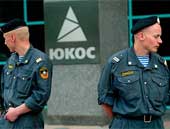Outcomes of the Yukos case: everything is better than it seems
 The sentence on the former CEO of Yukos Mikhail Khodorkovsky and his accomplices is yet to be pronounced, but the so-called liberal media and experts are already going into hysteric about the damage which the indictment for these "prisoners of conscience" will supposedly cause.
The sentence on the former CEO of Yukos Mikhail Khodorkovsky and his accomplices is yet to be pronounced, but the so-called liberal media and experts are already going into hysteric about the damage which the indictment for these "prisoners of conscience" will supposedly cause.

Some of them fear that if the verdict turns out to be too harsh, a new wave of "expropriations" and repartitions of property will ensue. And those imagined moves in turn will force the least politicized entrepreneurs to get engaged in politics, especially in view of the on-coming elections. Moreover, the continuation of the "crusade" against the big business (for example, against the diamond-producing "ALROSA") will supposedly provoke social unrest in regions.
Some predict capital flight, withdrawal of foreign investments and many other troubles, which, according to the alarmists, will befall Russia, if Khodorkovsky and part of his team go to prison.
One of such "prophets", an economic adviser to the president Andrei Illarionov, foretells unceasingly the catastrophic outcomes of the Yukos case not only for the company itself, but for the whole country. The situation with Yukos, repeats Illarionov, "inflicts the biggest damage to the political image of Russia", and "deteriorates the investment climate".
All these embedded clichйs are surprisingly easily accepted by the society, even despite the fact that three world's leading economic agencies Fitch, Standard & Poor and Moody's one after another raised the Russia's investment rating – the most important indicator of stability and predictability of a nation. It's difficult to accuse these reputed institutions of the benevolence to Russia. What is more, the inflow of the foreign investments in Russia increased significantly the last year.
But the fact persists: the Yukos case would have remained practically unnoticed abroad, if it hadn't been deliberately boosted by the interested party. More than 600 large-scale companies are currently prosecuted in USA, but no one of their top managers is regarded as a prisoner of conscience, and U.S. investment appeal doesn't deteriorate because of these cases.
The situation in Russia is not that bad as it may appear to a naive listener of the Yukos men and their defenders.
First of all, it's worth remembering that money exacted from Yukos in the first quarter of 2005 provided for almost 20% of all budget income of the period. There's nothing to be particularly proud of in this fact. But it's impossible to deny that the Yukos case has had an instructive and disciplining effect on the Russian big business, conceived in troubled and criminal atmosphere of 90s. As early as in the first quarter of 2004 the tax-collecting agency registered the tenfold rise in the revenue from the tax on the minerals extraction.
Many observers suggested that the real cause of this rise was the renunciation by the oil & gas-extracting companies (e.g. Lukoil, Sibneft, TNK-BP as well as the Russian Aluminium and the Siberian Energetic Coal Company) to use tax-evading schemes (mainly so-called off-shores) because of the fear to repeat the fate of Khodorkovsky.
Some of these companies (e.g. Lukoil) even hurried up to compensate voluntarily their arrears (only Lukoil paid $103 million of arrears). As a result the taxes which used to be siphoned off to off-shores came to regional budgets, thus helping to the development of the respective regions. A good example is Sibneft which declared net profit (and accordingly the paid taxes) in 2004 increased 15 (!) times more as compared to 2003.
So how dangerous is a political facet of the Yukos case? The danger is mainly posed by the activity of the company's owners and its spin doctors. One cannot ignore the enormous work made by them in discrediting the image of Russia abroad and her leadership inside the country. But that's another story altogether.
Subscribe to Pravda.Ru Telegram channel, Facebook, RSS!


